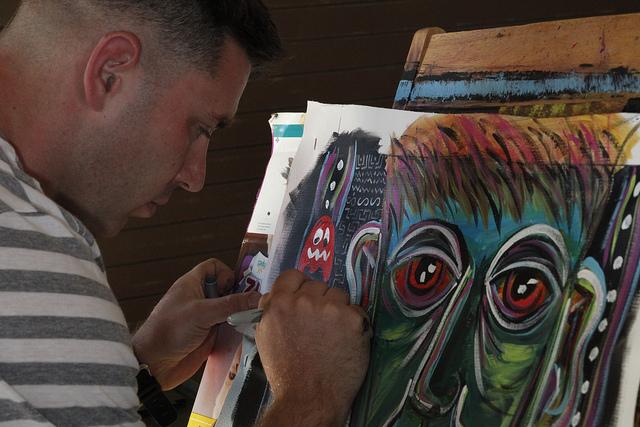Some soldiers confront reality where PTSD is part of their identity
Sgt. Shane P. Santelli paints as part of his PTSD healing process on April 3, 2012. (Photo courtesy of Marine Corps Air Station Cherry Point.)
Post-dramatic stress disorder haunts some American soldiers returning home from wars in the Middle East.
For those affected, the traumatic experience of war is almost impossible to shake. More than 1 in 5 of the more than 2 million combat veterans from those wars experience some symptoms related to PTSD — and its a complicated phenomenon.
The symptoms are often difficult to detect, as they lie invisibly inside a soldier’s psyche. It seems that for every image of a soldier returning to the arms of his family is the story of another unable to cope with trauma.
The disorder has also found its way into popular culture, especially on the big screen. The Jason Bourne movies focused on a soldier who’s deliberately given symptoms of PTSD to make him more aggressive and dangerous.
But PTSD is not about movie plots and mind control — it is about identity.
Screenwriter Matt Cook says his identity changed after the 9/11 attacks — after serving in the war in Iraq and then returning to the battlefield as a civilian. Cook said watching movies like the Bourne series led him to want to “taste their pain.”
“Before joining the military, I sort of romanticized that pain that these guys had felt and I wanted to share those experiences, oddly enough.” Cook said. “I felt like I needed to connect myself with something like that to kind of fulfill you know the sort of rite of passage that I wanted, to become a man.”
Things moved quickly for Cook – his first day of basic training was Sept. 11. Two of his friends were killed during his first firefight overseas.
“So that one haunts me quite a bit,” Cook said. “There’s some that I think about more than others, but overall it was a pretty maddening experience.”
Much has been written lately about another mental health consequence falling on the soldiers in recent wars: suicide.
Before 2001, the suicide rate among soldiers was lower than among civilians. Those totals both increased during the war years, but the gap became smaller. In 2012, 350 active-duty troops committed suicide.
Cook’s distress never brought him to that level, but instead sent him back to war.
“When we came home, you’re looking for something to kind of fill that void and there’s nothing in normal civilian life where you can find that satisfaction,” he said.
Cook said he surprised himself with how quickly spending time away from the war let it slip from his mind even though it was a life-changing experience he didn’t want to forget.
“It’s a hard pill to swallow when you come home and everything you’ve fought for and sacrificed for, it’s just kind of blasé,” he said. “It’s hard, you have to turn into yourself to deal with things.”
Despite the effects of PTSD and what he considers to be a war without agenda, Cook remains proud of his service.
“No number of excuses will kind of help me rationalize why we were there,” Cook said. “But I’m extremely proud that I was a part of it and that I knew the men and women I served with.”
